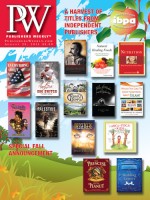Orlean, author of the bestselling The Orchid Thief, delves into the life of one of Hollywood’s most iconic stars, the German shepherd Rin Tin Tin, in her biography of the beloved dog and his handlers in Rin Tin Tin: The Life and the Legend.
Much of the book focuses on Lee Duncan’s tight-knit bond with Rin Tin Tin and how Rinty helped Duncan heal from a lonely childhood. Have you felt a similar connection with a pet?
Fortunately, my childhood wasn’t at all like Lee’s: I had a warm family, siblings, and a lot of friends. But the first dog I had gotten as my own, when I was in college, was my greatest intimate. She heard all my heartbreak stories, my dramas and anxieties. When she died, I felt like the only creature who knew all my secrets was gone.
In the book, you mention having watched The Adventures of Rin Tin Tin as well as a childhood fascination with a Rin Tin Tin figurine that sat out of reach on your grandfather’s desk. What persuaded you that he was a subject you’d like to write about?
The power of memory is one of the important themes in the book. My memory of Rin Tin Tin, and in particular my memory of that figurine, and the persistence of those memories, were essential to my interest in the subject. As I learned more about Rin Tin Tin’s history, the mystery of my grandfather’s attachment to that figurine suddenly seemed to reveal itself, and since it tracked such an important part of history, it became a natural theme for the book.
Were any particular writers on your mind as you worked on this book?
I always keep in mind my heroes: John McPhee, Joan Didion, Ian Frazier, Joseph Mitchell. When I tried to conjure early Hollywood, I thought about Didion a lot because she has written so masterfully about the more contemporary Hollywood. Otherwise, I looked to those other writers to remind and reassure myself that writing about history can be made to feel very much alive, and that writers who aren’t trained historians can do it well.
Rin Tin Tin involved a great deal of research, some of which you chronicle in the book itself. What was it like to immerse yourself so deeply in this world?
Overwhelming! I never imagined the story would take me through close to 100 years of history and culture. The appearance of Rin Tin Tin in so many different chapters of history made me feel as if he were a sort of Zelig, who was always just at the edge of the frame no matter what I looked at. I sometimes felt I was transported into each of these periods, especially the two world wars.
You write about feeling a sense of closeness to Lee Duncan and others during the research and writing process. How do you feel now that this nearly 10-year effort is over?
The end of a book is bittersweet. It’s like having your child grow up and go to college. You feel that you’re sending it out into the world, where it will be embraced by other people and won’t be your private story anymore. I always feel both sad and excited as that process occurs; detaching from my subjects is always hard.
What’s your next project?
Sleep.



 Volume 258
Issue 35
08/29/2011
Volume 258
Issue 35
08/29/2011





